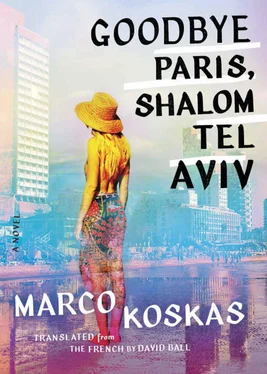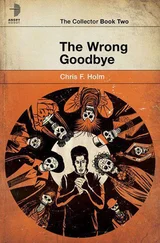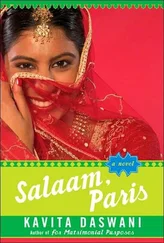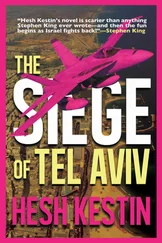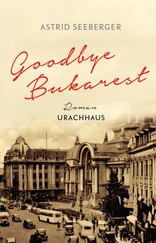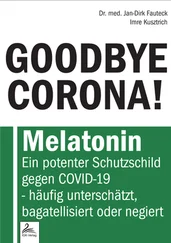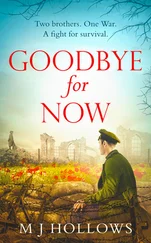“What’s more, we’re doing a blackout on Olga!” a third one chimes in.
“OK, OK,” Marcel answers, sensing a growing rebellion. “I promise I’ll clarify the situation before tonight. Meanwhile, I’ll take it on myself to put Elias back in the newsroom.”
The tension drops then, and Elias tastes a bit of inner peace at last. And yet Marcel knows the case inside out. He knows it’s not so simple and Elias and Olga are not entirely blameless. But you have to save the store and face up if the machine is to continue to work. Luckily, for the moment, the Israeli media outlets aren’t interested in the story. That gives him elbow room. Even Kirzenbaum has dropped it, no doubt afraid of being accused in his turn.
After work, Elias rushes to Kerem without taking any precautions. He’s avid to hear about Olga, and Diabolo doesn’t wait to be asked. He pretends he was at the hearing and embellishes the scene as much as possible. Inventing, making up stories, faking it to make someone happy—that’s his thing, Diabolo. No need to push him.
“Y’know, she was fantastic on the stand, with the beautiful way she holds her head and her braided hair. Believe me, you’re lucky to have a chick like that. She spotted me from far away, and she made a heart with both hands for me to take a message, and she wrote, ‘Elias, I love you’ with a marker on a piece of paper. The judge even asked her to be more discreet, you get the atmosphere, but it’s wild, she’s got you under her skin, trust me. And you should’ve seen Jérémie, he was perfect, he’s a real mensch, believe you me.”
“I hope he’s not too expensive. I’m afraid to talk about bread with him.”
“Cool it, we’ll owe him, that’s all.”
“I feel like throwing a Frisbee,” Elias says suddenly.
“Frisbee, now there’s something new.”
“Come on, we’ll go to the beach and play a little game.”
They walk to Banana Beach, which is next door, with Diabolo dragging his massive body along and Elias charging ahead. On Sunday afternoon, there are few people on the sand, and it’s the best time to play, just before sunset. It sure is a change from Paris, nine miles of beach available all year round. It’s even disproportionately long for a city like Tel Aviv, but above all it has an almost magnetic pull on French immigrants: you see them walking or biking up and down the Tayelet, not out of necessity, but just to take a look at the Banana Café to see if anybody’s hanging out there, like when you’re a teenager or on vacation, or like reminiscences of North Africa in times gone by, Khereddine and El Marsa, the Mediterranean, the dark skin of the girls and your buddies. Banana Beach is one of the last beaches of Tel Aviv before Yafo. It comes before Blue Bird, the surfers’ beach, and it’s recognizable not only by the green deck chairs and yellow beach umbrellas, but also by its bands of newly arrived French women and men of all ages. You can also find lots of French on Gordon Beach in the other direction, toward the north, where the developments on the Tayelet strangely make you think of a Hopper painting, God knows why, given the lathed promenades of the flooring and the smooth stone benches. It probably has to do with their geometry or design—who knows exactly why—but anyway, Elias is ready to throw the Frisbee when he gets a selfie from Juliette with little pink hearts and his urge to play immediately drains from him in a mixture of discouragement, shame, and remorse. Then a second message, just one word: Tonight? She wants to start again, it’s clear, doesn’t want to admit he was just momentarily distraught last night; it was a fit of passing madness like the time before, due to his anguish at being deprived of Olga. So Elias sits down on the sand, without feeling like playing at all, cursing himself and asking why he lets himself be ruled by his dick. And why did he screw her without a condom?
Not too unhappy that the game ended before it began, Diabolo comes up to him, slightly worried to see him in this state.
“Bad news?” he asks soberly.
“I’m so fucking sick of my screwups, Diabo… so sick, you know…”
“Don’t torture yourself, it’ll be OK. It always is.”
“Help me, Gérard, I’m running right into a wall. Please give me some advice.”
“What’s your latest fuckup?”
“I slept with Juliette last night.”
“Now there, you’ve got the rights to a Gold Card,” Diabolo says, lightly.
“Without a condom.”
“Let’s go have a drink.”
At this moment, a trio of malcontents charge out of the Banana Café with mean looks on their faces, full of frontal aggressivity toward Diabolo. They’re young guys he hired as reporters at IBN despite their uncertain French, but he hasn’t paid them for the month, as the coffers are more or less empty. Diabolo’s prosperous period is no more, as Elias realized when he saw the box of Havanas reduced to its starkest state the night before. IBN hasn’t earned a thing up to now and costs more than it was supposed to, but these three little guys don’t give a good goddamn. And they’re mad as hell. Usually so full of respect for the boss, so solicitous, here they are with daggers drawn. Because they could already see themselves as star reporters, these guys—PPDA, FOG, BHL, their names contracted into universally known acronyms—and they believed so much in Diabo as a great media magnate! Great is their disillusion, strong is their bitterness.
“I want my money!” says one.
“You owe us!” the other says, rubbing his thumb against his forefinger.
“OK, guys,” Diabolo replies. “I had a little cash flow problem, but it’ll be settled next week.”
“What day?” the third asks.
“Monday or Tuesday,” Diabolo answers. “Here’s a thousand bucks each, and the rest next week. But don’t forget the refresher session Friday morning.”
“Session of what?” they say in chorus, counting the bills.
“Accelerated literacy, by Jove!”
“Huh? You taking us for idiots or what?”
“You’re gonna have to review,” Diabolo insists, poker faced. “Spelling, grammar, punctuation. The whole megillah.” And the three jerks go off, furious, kicking the air.
There’s no way to hide it behind a haystack anymore, Diabolo’s heading straight for bankruptcy. But he still has the strength of his natural optimism. That’s the way he is. He dreams his life like a rock star.
“Basically, I’m just the second wife,” Juliette complains, putting her head on Manu’s shoulder. He was going by Moins de Mille.
“Come have a drink with me,” Manu suggests.
They sit down in the Udna, facing the gallery, and order two glasses of Chardonnay. It’s the most rundown café in Florentin: nothing but wobbly tables and three-legged chairs, but it has its charm, just opposite the slum. When there are great soccer matches, like the World Cup, everyone who’s hip in Tel Aviv is there in front of giant screens. It’s packed Friday nights, too, and the crowd overflows onto the sidewalk. It’s a vestige of the old Tel Aviv, like a charm from the seventies, with the fine sense of freedom that reigned in those days before speculation took over the town.
“For Olga, great emotions and great plans, for me, a lay on the q.t.,” Juliette sighs. “In secret, as a bonus. It revolts me, but…”
Impossible to say three sentences in a row without someone coming to interrupt her, give her a hug, talk to her about work, ask her for an appointment. She answers everyone with real kindness. Yet God knows her head is elsewhere. And then as far as contemporary art is concerned, she likes it, but basically she doesn’t give a damn. She studied museology, not the market. Maybe that’s why she got ahead so quickly in Tel Aviv. Her detachment, coupled with her sincere attention to the artists and their works, has attracted good painters and good people. And money’s beginning to flow into her pockets, for her boss recently gave her a commission on every sale, for fear that she’d offer her services to others.
Читать дальше
